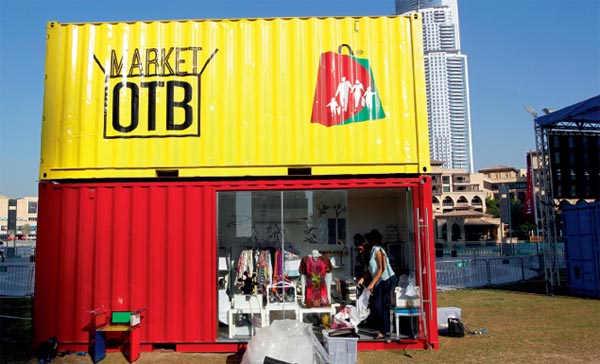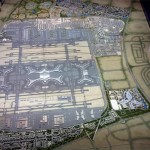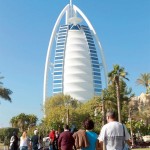In line with the spirit of Expo 2020, the DSF has taken an innovative step towards a greener community, launching the region’s first sustainable fashion and lifestyle marketplace made from shipping containers.
Suresh Pattali finds out the DSF’s sustainable practices and what more can be done to shore them up.
Ten years ago, in a world where smoking was a cultural attribute or a fashion statement, Dubai managed to achieve what many thought was next to impossible. The emirate started to enforce a ban on smoking in shopping malls in 2004. The ugly scene of sand-filled public ashtrays with cigarette butts sticking out and the obnoxious toxic cloud drifting along in the malls have all disappeared. Civic campaigns made us realise that such freedoms are snatched away for our own good, and we nodded in compliance.
Businesses only thrived in the following decade, proving beyond a whiff of doubt that eco-conscious consumerism is not an impediment but a soul-filling experience that helps you “shop at your best”.
The UAE has come a long way in a short time in promoting environmental causes. As the city’s remarkable growth triggered an influx of global business giants, a new corporate culture that came along helped change people’s mindset on social responsibility. Mass public programmes to raise environmental awareness have since become part of Dubai’s calendar of events.
At the same time, the government made great strides by investing billions in renewable energy and clean technology programmes aimed at supporting economic diversification and human capital development. As more and more nations were convinced sustainable living is the only way forward to protect planet Earth and that “it’s no longer unimaginable to think that businesses can thrive in an environment-friendly manner”, Dubai heeded the green call and pledged to build its mega Expo 2020 project on the three pillars of sustainability — economic, environmental and social.
The Expo venue, which will be built off Jebel Ali, is touted to be based on sustainable principles. The city will become more environment-friendly, as the Dubai Expo targets to produce 50 per cent of its energy requirements on site.
Following in the footsteps of Expo 2020, the Dubai Shopping Festival (DSF) has taken a small yet significant step towards the green concept, by launching the region’s first sustainable fashion and lifestyle marketplace made from shipping containers.
All retail, lifestyle and F&B brands participating in “Market Outside the Box” at Burj Park operate out of stylishly refurbished shipping containers. The containers have been completely transformed into retail stores, cafes, and food kiosks, using a popular green concept already present in some places.
That’s one small step for the DSF, a giant message for society.
“Market OTB … demonstrates the Dubai Festivals and Retail Establishment’s (DFRE) commitment to launch innovative initiatives at every DSF and also in line with green practices that are being implemented across Dubai and the UAE by the government and private sectors,” DFRE chief executive Laila Mohammed Suhail told Khaleej Times.
“It is gratifying to note that the values we’ve held for years, striving for energy efficiency, conserving water, and promoting other sustainable practices have become so crucial in the world we live in today and is rapidly gaining momentum and acceptance as a green culture that cannot be ignored, she explained.
“Market OTB is bringing to Dubai a green concept that is already popular in cities like New York and London, and which has the potential to endear itself to DSF visitors, both residents and tourists, who come from all corners of the world,” she added.
Environmental activists and residents alike said a lot more could to be done to help achieve Dubai’s vision to be a sustainable city.
“Considering the rate at which the earth is experiencing climate change, water resources are running out and energy being exploited, there is an urgent need for everyone to become more eco-friendly. As individuals, we often overlook the power we have to influence change. In reality, every dirham we spend influences the amount of water, energy and waste that products, services, and the overall retail industry is responsible for,” said Gundeep Singh, founder and CEO, The Change Initiative.
“And the DSF is the perfect platform for customers to practise responsible consumerism because it is one of the biggest shopping events in the Middle East; it has the power to influence huge numbers of shops and shoppers,” Singh told Khaleej Times.
Electronic event registration, digital rather than paper marketing, recycling bins at the venues and subsidised public transport are some of the options Singh has to suggest to make the DSF greener.
But Suhail explained that organising events related to environmental conservation and green practices during the DSF is not new to the DFRE. “In the past too, we have introduced activities that help enlighten visitors, especially the youth on the importance of environmental and energy conservation. A striking feature of the DSF every year is that the lighting used in decorating and illuminating the DSF destinations and streets of Dubai is powered by energy-efficient LED bulbs,” she added.
“Our policies in such areas are based on the directives issued by the UAE government, which contribute towards adding value to the environment.”
Habiba Al Marashi, chairperson of the Emirates Environmental Group and president, UN Global Compact Network — GCC States, opined that the DSF is a huge event attracting tens of thousands of people from all over the world and a large amount of waste is thus generated during this time. “To ensure that this waste does not go to the landfills, a proper recycling initiative is of utmost importance. That said, recycling the waste is not the only issue for an event of this scale. Going green will also show DSF visitors that the UAE cares about its environment and is serious about such recycling initiatives.” Al Marashi told Khaleej Times.
She said this message needs to be passed on to the visitors who, in turn, will spread it back in their home countries, thus becoming an international movement originating from the DSF.
Al Marashi explained that there are a number of ways the DSF can go greener. “Having recycling outlet bins at shopping festival venues is the very first step. This encourages people to properly dispose of their waste during the festival, thus reducing the amount of waste going to the landfills, she added.
“Using recycled paper is another way to reduce the amount of trees which need to be cut to provide the large amount of leaflets circulated during the festival. Using clean energy and ensuring the power is turned off at the end of the day reduces the amount of energy required during the festival,” Al Marashi said.
She added that the most important method, however, is to spread the green message among the festival attendees. Having posters and flyers at the festival promoting recycling and energy conservation is a perfect way to inform them that the DSF is meant to be a green festival, the environmental campaigner said.
Al Marashi said the EEG, which has worked with the DSF for many years through its different programmes, is always willing to join hands with them so that such initiatives will prove to be key milestones in promoting the recycling culture throughout the UAE and abroad.
Asked if the DSF should make it obligatory for participating retailers to go eco-friendly, the chairperson said most organisations already realise the importance of eco-friendly packaging. “But since it has not been made a norm, only a very few follow the rules. Making this a requirement for participating organisations will ensure that the impact on the environment is reduced and they do their part to preserve the environment.”
Suhail, however, said every business has a responsibility towards the community in which it operates and towards society, and retailers participating in the Market OTB are all doing so with the common goal of highlighting the importance and benefits of non-mass produced sustainable products, in an environmental setting such as refurbished shipping containers. “We believe that innovative events like Market OTB will put the spotlight on responsible use of natural resources and environmentally-conscious operations that will shape a greener community in the future,” DFRE chief said.
The Change Initiative’s Singh also suggested it would be ideal if the DSF made it mandatory for participating outlets to be eco-friendly. He said one of the requirements could be to use recyclable paper bags instead of plastic bags or better yet, ask everyone to use reusable bags.
“Taking these small sustainable steps could lead to outlets being even more eco-friendly in the future. Alternatively, the DSF could reward outlets that are particularly sustainable, in terms of the water, energy and waste produced by the outlet, and the types of eco and socially responsible products that are sold,” Singh said.
Various people Khaleej Times spoke to suggested digitising the DSF raffle draws to reduce the use of paper. “Digitising raffle draws is a perfect way to reduce the amount of paper being used during the festival. Such a move will also ensure that it reaches a wider audience since online campaigns have always attracted a larger crowd. Another way to reduce the impact is to use recycled paper for any raffle coupons being printed. Using recycled paper immensely reduces the amount of trees being cut, and the paper being used can be recycled to make coupons for the next festival,” Al Marashi added.
Ashish Punjabi, chief operating officer of Jacky’s Group of Companies, also batted for digitising the raffle draws. “As far as our day-to-day operations are concerned, we’ve been using tablets for raffles for several years now,” he said.
Punjabi said many of the malls already have guidelines in terms of what materials retailers can use in shop fitouts, out of consideration for the environment. “Our shopping bags use materials that the local authorities have advised us to use. We also do recommend customers to reuse bags wherever possible.”
The Change Initiative said using paper for raffle coupons contributes to deforestation and disposing of the paper coupons creates a lot of waste, especially if they don’t end up being recycled. “Digitising the raffle draws would solve these problems, although in a perfect world we would be able to charge our smartphones with renewable energy and move towards a closed-loop supply chain in the mobile phone industry. Other options would be to print using soy-based inks on recycled, certified paper from organisations such as the Forest Stewardship Council or on bamboo paper,” Singh added.
Jumbo, one of the key sponsors of the DSF, said it has always supported the ‘Go Green’ initiative although there is plenty more that can be done.
“The Jumbo store network has already switched to bio-degradable plastic bags over the last couple of years. It doesn’t stop here; we have also introduced various products that will help our consumers conserve and save energy like solar-powered phone cases, LED light bulbs that can be controlled through WiFi via a smartphone, and the like. Other initiatives are under consideration,” said Vishesh Bhatia, chief executive officer, Jumbo Electronics.
However, EVK Murali, a long-time resident of Dubai, said the DSF after all is a festival which is bound to generate waste. “There is a pressing need to raise our collective consciousness on sustainability. When it comes to protecting the planet, every little drop of effort counts. It’s high time we realised it only takes a little effort to make a big difference.”
The Change Initiative said the Dubai government is making huge efforts to manage its resources. “During the DSF residents can do their part by using public transport wherever possible, carrying reusable shopping bags and choosing to shop at outlets that are environmentally aware,” Singh added.



